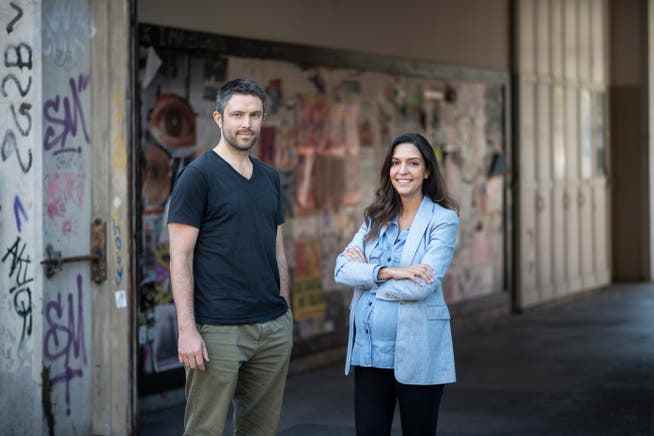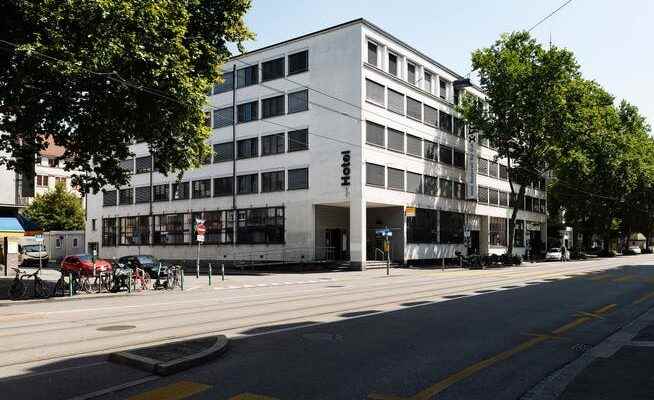The owner of the Limmathaus makes a U-turn and wants to finance the renovation herself. The club operators are irritated.
The current operators must leave the Limmathaus by the end of 2023.
In front of the Limmathaus in the city of Zurich it is often dead during the day. The club’s forecourt looks deserted, the hotel is closed. It only comes alive in the evenings, when the club opens, when parties and concerts take place. The end of 2023 should be the end here. The lease agreement with the current operator, the X-tra Limmathaus, is expiring. The Limmathaus Foundation, owner of the building, wants to hand over the premises to the Impact Hub start-up network.
A lot is at stake for both companies. Without the Limmathaus, the “X-tra” faces an uncertain future. The Impact Hub also has a problem. It will have to leave its current location in the power plant near the Selnau train station in mid-2025: the city wants to use the premises as an energy center for the Cool City energy network in the future. Because the Impact Hub also has to give up its second location on Sihlquai – the canton is planning a vocational training mile here – the operators of the Impact Hub have to reorient themselves.
For two years they have known where to go: to the Limmathaus. Actually. In 2020, the Impact Hub and the Limmathaus Foundation signed a declaration of intent. After extensive renovation, the start-up community was to move into the building in which Klub X-tra has been renting for over 20 years. But Jürg Burkhardt, who runs the “X-tra”, doesn’t want to leave the house.
Since then, a dispute has been raging about the future of the Limmathaus, in which the city, as the sponsor, should also have a say. It was brought on because the board of trustees was unable to manage the renovation, which cost around 24 million Swiss francs, on its own. A non-partisan group from SVP to AL finally demanded in a postulate from the city to develop two usage options for the Limmathaus: an Impact Hub option, an “X-tra”. The city council then withdrew its loan application. And the Impact Hub saw its existence threatened.
But now the coup: The Limmathaus Foundation announced on Friday that they wanted to raise the money for the renovation of the building themselves. The Impact Hub will move into the Limmathaus on January 1, 2024 – in the still unrenovated property.
How did this twist come about?
Limmathaus urgently needs to be renovated
Bruno Hohl, President of the Foundation Council of the Limmathaus Foundation, says that after a selection process lasting several months in the summer of 202o, it was unanimously clear to the foundation that the Impact Hub was the ideal tenant for the Limmathaus. «We want an open house that is oriented towards the community and where many people come and go. The Impact Hub can meet this requirement.” Hohl is convinced: “The offer of the new operators will be larger and more diverse than the current one.” And it should start as soon as possible. Therefore, the Impact Hub will move in before the renovation.
It won’t be an easy task. The rooms in the listed Limmathaus urgently need to be renovated. And if the renovation starts in 2025 at the earliest, the Impact Hub will have to move again for 18 months. Nevertheless: The co-founder Christoph Birkholz is relieved that the Impact Hub now definitely has a future in the Limmathaus. The last few months have been grueling, he says. “For a long time we didn’t know how things would continue.”

Christoph Birkholz, co-founder of the Impact Hub, pictured here with young entrepreneur Fernanda B. Mutz.
As far as the financing of the renovation is concerned, the President of the Foundation Council, Hohl, is optimistic. On the one hand, financial institutions have shown themselves open to financing. On the other hand, there are interested private donors. The foundation itself can also assume a small part of the costs. “Of course we would be happy if the city or the canton would also make a contribution,” says Hohl.
Especially because the building, which was built in 1930, is open to the public and a monument. “But the financing of the renovation no longer depends solely on the city.” The foundation has therefore suspended its application for funding from the city. This also means that the city no longer has a say in the choice of future tenants. According to the foundation, the foundation’s considerations of one day handing over the building to the city are no longer current.
Birkholz knows: The Impact Hub’s commitment is viewed critically, especially in circles close to the “X-tra”. Fears were raised that the Limmathaus could become an introspective temple for the startup community. “It won’t be like that,” says Birkholz. The Impact Hub is already organizing concerts on its premises and will continue to work together with cultural partners in the Limmathaus in the future.
Voices from local residents, cultural workers and the public sector were incorporated into the concept developed for the Limmathaus. Studios, work rooms and areas for creative people are to be built in the former hotel. The gastronomy should be more open and include the forecourt of the Limmathaus, and parties and concerts are still planned in the large hall. “We want to give both non-commercial and commercial providers a platform and appeal to a broad audience.”
Bruno Hohl says: “The Impact Hub wants to implement a concept that is financially viable and that the Board of Trustees wanted.”
Operators of the “X-Tra” don’t want to give up
Those responsible for the “X-Tra” reacted with dismay to the actions of the foundation. Media spokesman Pascal Münger speaks of a “carded game”. “The foundation and the Impact Hub are needlessly eliminating 150 jobs associated with the operation of the ‘X-Tra’,” he says. “The existing lease could easily be extended by a year, especially since the Impact Hub does not have to move out of its current locations immediately. The renovation could then be tackled in peace. That would give us more time to react.”
With the current approach, it is clear that the “X-Tra” is not given a fair chance and “destroys an important cultural institution in the city of Zurich through the back door”. Next Tuesday, the operators will provide information on how to proceed with the “X-Tra”. The «Limmathaus der Musik» aims to strengthen the cultural landscape and the music industry. “We will not give up. And we are still willing to find a solution together with everyone,” says Münger.
At least for the operators of the “X-Tra” the last word has not yet been spoken – it should be different for the foundation.
